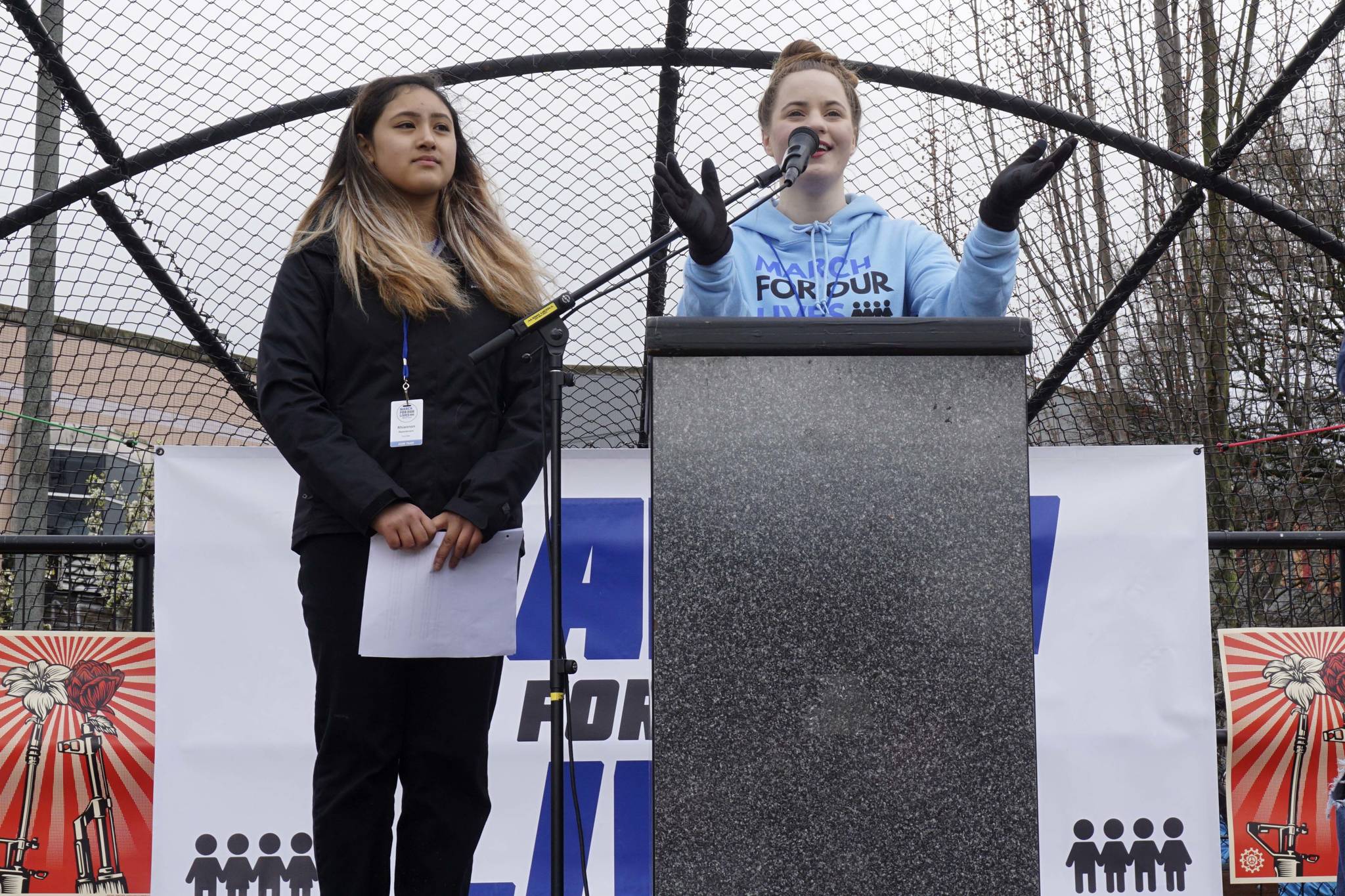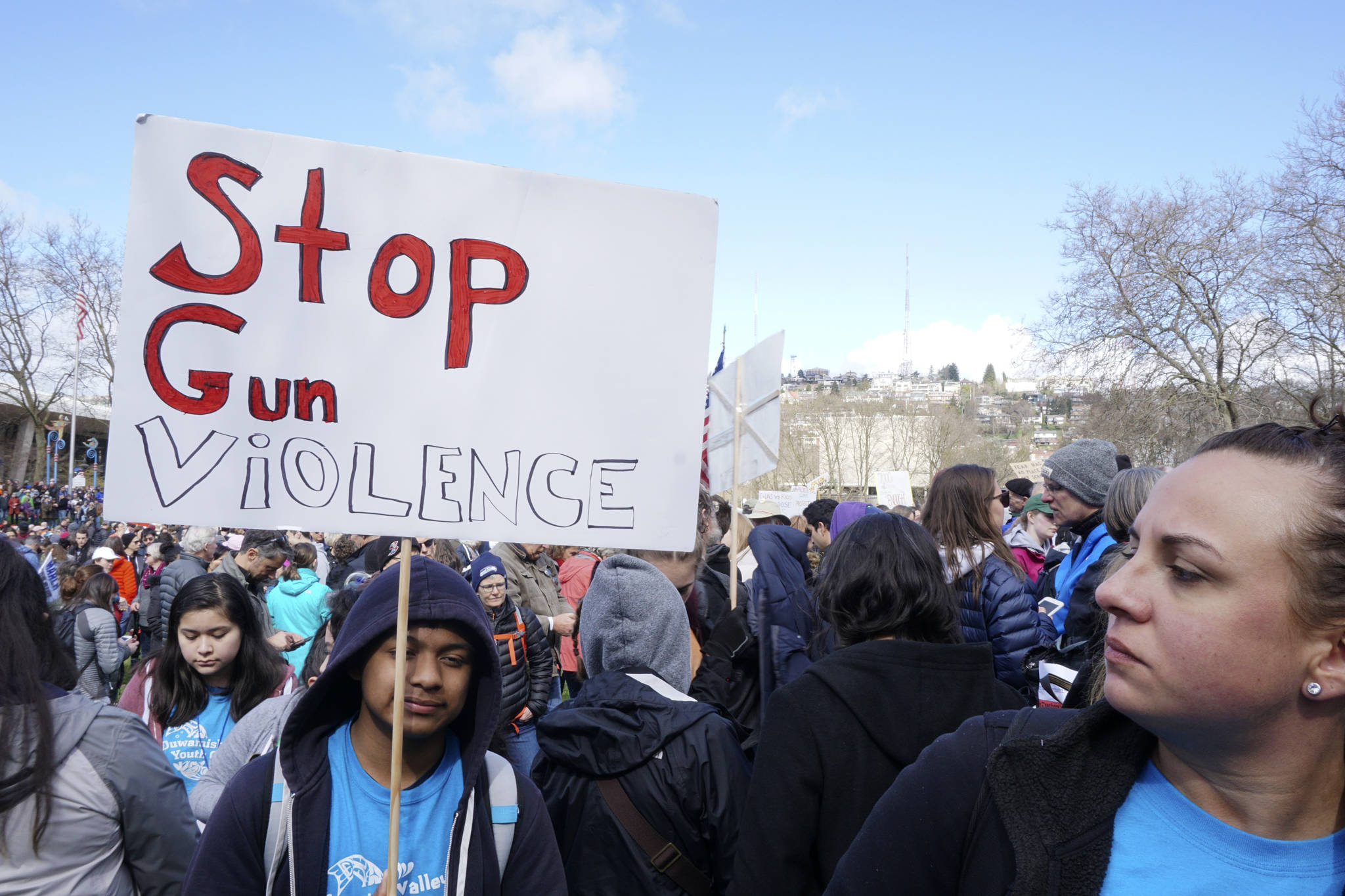The fatal shooting of 17 people at Marjory Stoneman Douglas High School in Parkland, Fla. on Feb. 14 spurred many youth to demand safer schools and stricter gun control legislation. Among the student activists was Emilia Allard, an 18-year-old Ballard High School senior who feared that her younger sister’s autism would jeopardize her safety and that of her classmates in the event of a school shooting.
Concern for her sister’s safety motivated Allard to form the March for Our Lives Seattle with Tahoma High School senior Rhiannon Rasaretnam. Together, they galvanized thousands of demonstrators to gather on Saturday, March 24 and call on politicians to enhance background checks, raise the age to purchase a gun, and ban the sale of assault and semi-automatic rifles. “Knowing that almost any senior in my school could easily — and legally, obtain the same destructive weapons used in the Parkland shooting/many of the shootings beforehand, is troubling, and quite frankly terrifying,” Allard wrote in an email to Seattle Weekly.
Heeding some of those demands, the Washington-based anti-gun violence organization decided to take matters into their own hands. On April 20, 19 years after the Columbine High School massacre, the Alliance for Gun Responsibility announced a 2018 ballot initiative that seeks to make schools safer.
The Reduce Assault Weapon Violence: Safe Schools, Safe Communities Initiative would raise the buying age to purchase semi-automatic weapons to 21 years old, create an enhanced background check for semi-automatic weapons, require the secure storage of guns, and necessitate that purchasers show completion of a firearm safety training course. It would also require that sellers inform purchasers of the inherent risks to owning a firearm, and would establish up to a 10 day waiting period to purchase an assault weapon. Katy Klein, a spokesperson for The Alliance for Gun Responsibility, said that the organization was inspired to create the initiative after Senate Bill 6620, which would have raised the minimum age to purchase a semi-automatic rifle to 21, failed in the State Legislature during the 2018 session. The organization plans to run an aggressive campaign to gain the over 259,000 signatures of Washington registered voters needed to be placed on the 2018 ballot.
“Gun violence is an avoidable epidemic and is far too common in our country and state. Too many people have lost their lives to violence; too many families, children, and communities are rattled to the core. The people of Washington—from the kids marching for their lives, to their parents and grandparents who are calling their elected officials– demand action NOW,” Renée Hopkins, CEO of the Alliance for Gun Responsibility, wrote in a press release. “We’re answering their call with a comprehensive ballot initiative to help ensure safer schools and neighborhoods and through extensive work with voters ahead of November’s election. We must elect more gun responsibility champions and do whatever we can to strengthen our gun violence prevention laws.”
According to Klein, the successful passage of the group’s two other initiatives—the Universal Background Checks on the 2014 ballot and Extreme Risk Protection Orders in 2016—indicate that Washington voters are eager for stricter gun control measures.
“In Washington, it is currently easier to buy an assault weapon than it is to purchase a handgun because assault weapons are treated the same as hunting rifles. This must change,” Klein wrote in an email to Seattle Weekly. She referenced a 2016 Mukilteo shooting in which a 19-year-old killed three people and seriously wounded another teen at a party as a reason for stricter gun control: “The weapon and the magazine were purchased at a local shop after a background check that took only minutes and the shooter read the instruction manual for the gun in his car outside the party. We know that access to means matters for someone in crisis, so we have to establish some commonsense safety measures to ensure these dangerous weapons don’t land in the wrong hands.”
In Allard and Klein’s eyes, recent homicide reports and studies on brain development indicate that 18 year olds should be prohibited from purchasing assault weapons. For instance, FBI data from 1980 to 2008 revealed that people under 25 are responsible for a disproportionate number of firearm homicides in the United States. Moreover, recent studies indicate that the pre-frontal cortex—the area in the brain responsible for decision making, impulse control, and risk assessment — does not mature until at least the mid-20s. “I support raising the age to purchase a fire gun, simply because it is common sense,” wrote Allard. “I think the purchase age should be the same for all weapons — but that 21 is much more responsible age to be doing so than 18. Especially since many high schoolers are 18, and should not be legally allowed to obtain weapons like these.”
A recent Washington Post analysis also showed that more than 210,000 children at 213 schools have been exposed to gun violence at school since the Columbine shooting, and that seven in 10 of the school shooters were under the age of 18. Klein said that these statistics indicate a need for secure storage of guns in homes, which the initiative seeks to enforce by holding “gun owners responsible if a child or other prohibited person accesses and uses an unsafely stored firearm to harm themselves or another person,” the press release stated.
As the gun control debate continues to gain steam throughout the country, Washington voters have followed suit by staging rallies for and against stricter gun control measures. On April 20, Allard participated in another walkout at Ballard High School to commemorate the 19th anniversary of the Columbine shooting, and to “support the youth who share the same passion for change,” she wrote.
But not everyone agrees that stronger gun control measures will make Washington safer. The day after the walkout on April 21, gun rights advocates in the March for Our Rights Rally outside of the State Capitol called on voters to dismiss the Alliance for Gun Responsibility’s initiative.
“We’re going to start a campaign that says ‘decline to sign,’ ” Sen. Phil Fortunato (R-Auburn) told the crowd assembled at Saturday’s Rally, according to the Seattle Times. “Don’t sign it.”
mhellmann@seattleweekly.com









